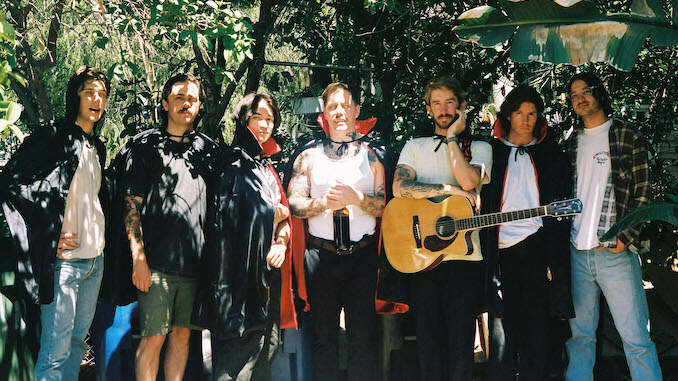When did we start associating pop music with the future? Around the time of Purity Ring’s Shrines and Grimes’ Visions, the term “future pop” started getting thrown around to describe a certain glossy, highly processed synth music that sounded just as underground as it did immediate and pulse-pounding. And then it wasn’t so futuristic anymore. Purity Ring began writing for artists like Katy Perry, and their sound was emulated by Miley Cyrus and Taylor Swift. By the time they released their sophomore album, another eternity, their sound had not evolved—they sounded like those artists that had taken cues from them over the past few years.
The sonic innovation of Crystal Castles, iamamiwhoami and Grimes led to a jilted relationship with more mainstream pop music. Rather than fostering an equitable form of transference, pop relied on the percussive, vulnerable sounds of U.K. bass and bedroom electronic music. Pop respected the forward-thinking shift taking place in the electronic world, but failed to pass the baton conceptually.
In the interim, SOPHIE released her 2013 debut single “Nothing More To Say.” Within are three tracks that speak for themselves—energetic, dubby, with intense, ballroom vocals that twist and contort around candy-coated basslines. SOPHIE humbly undercut how simple her goals were in producing the EP, saying “I try to make music which is fun to dance to—that should be the loudest voice talking.” Though SOPHIE understates the effect of “Nothing More To Say,” her pure intentions were met with some acclaim; the track commands the dancefloor, and served as a prelude to the queer carnival SOPHIE would work towards crafting over the next several years.
SOPHIE would follow up on “Nothing More To Say” with “BIPP,” the first of many singles that comprised her Product compilation. “BIPP” was something of a proof of concept; SOPHIE honed in on the textural, latex-y sounds she’d become synonymous with. Product is often liquidy and off-putting, with lyrics relating to sexual pleasure and kink. The drops are massive, sometimes scarily so; the uneven beat and shimmery, magical synth of “Hard” contrasts with lyrics explicitly about BDSM play, giving the song an aggressively, almost weaponized, sense of femininity. The singles were retroactively packaged together in a compilation in 2015, with the physical release being bundled with a silicone piece of art meant to resemble a nonfunctioning sex toy.
Let’s get one thing out of the way—SOPHIE’s music is, and always has been, queer. For years, SOPHIE’s music, along with contemporaries like Kane West and PC Music’s A.G. Cook and Danny L Harle, laid the groundwork for what would soon become the “hyperpop” movement, a hazily defined microgenre bound only by a shared love of pop music conventions, a collaborative, DIY spirit and an inclusive mindset for PoC, trans and young artists. As these artists became more popular, The FADER published their 2014 (since-deleted) article “Feminine Appropriation Was 2014’s Biggest Electronic Music Trend,” which sought to pinpoint the supposed space male-presenting artists were taking from female artists for using feminine aesthetics in their music.
This sentiment was backed up by cis female producers like Grimes, who told The Guardian that SOPHIE’s name was “fucked up,” accusing SOPHIE, who was not yet publicly trans, of “pretend[ing she was] a girl.” Whether intentional or not, The FADER and Grimes’ rhetoric was an insurrection against SOPHIE and many other artists’ supposed gender. It was a transphobic dog whistle that, ultimately, could not be farther from “futuristic.”
By 2016, SOPHIE had attained a cult following among queer electronic music fans. Her playful take on consumerist culture, such as her collaborative effort QT, showed a keen awareness of systems that trap queer bodies and spaces where trans voices were barred from entry. Though SOPHIE had not publicly revealed she was transgender, the queer elements of her music were obvious to those who weren’t listening with a cis ear. It was around this time that Charli XCX announced she planned on working with SOPHIE for her forthcoming album.
Shortly after, Charli dropped her Vroom Vroom EP, produced primarily by SOPHIE alongside drag DJ Jodie Harsh, which signified a pivot in her sound. “Vroom Vroom” was an immediate hit among queer listeners, taking off on Tumblr and Twitter, and spurning its fair share of memes. The EP was derided by most critical outlets; Laura Snapes’ infamous pan (which she since disavowed as “nonsense”) for Pitchfork decried it as “pointedly uncommercial and abrasive.”
“Vroom Vroom” has since become an evergreen crowd pleaser at all of Charli’s shows, and it’s easy to see why. Look no further than Charli and SOPHIE’s show at Los Angeles’ El Rey Theatre—Charli’s clad in a black latex catsuit with Street Fighter-esque hair, wheezing the words as a chorus of gay voices bounce below. It’s essentially a high-octane version of what you might expect from a drag show; all energy, all sweat, all ass.
SOPHIE’s work with Charli would become some of her most popular, with the two coupling again on Charli’s beloved 2017 mixtapes Number 1 Angel and now-wildly-renowned Pop 2. Between releases, SOPHIE dropped her definitive artistic statement “It’s Okay To Cry.” By no exaggeration, “It’s Okay To Cry” was a radical work. Over ‘80s power ballad synths, SOPHIE wails about the edifying strength of gender euphoria.
The song came coupled with a music video, marking the first time SOPHIE attached her face to her work. Wearing glossy red lipstick and her iconic curly bob, SOPHIE presents herself as a nude goddess in front of a backdrop of cosmic storms, rainbows and night skies. Gradually, water erodes her makeup, and her hair goes limp. Occasionally her breast enters the shot as SOPHIE lifts her arms in a languid stretch. The song is relatively simple, and certainly the most digestible of SOPHIE’s oeuvre—it’s somewhat reminiscent of “Time After Time.”
What makes “It’s Okay To Cry” is how plainly SOPHIE chose to present herself. Her music up until this point had been mostly faceless. Her vocal samples had previously been criticized as “impossibly” girlish—here, she features her real voice. Though modulated, SOPHIE retains the timbre of her talking voice, real and exigent, imperfect. Is she singing to herself, or to a friend? Maybe both?
SOPHIE was a shepherd that led the queer community through the storm. She would later tell PAPER that “God is Trans” —SOPHIE believed in the power of self-creation, the liberation of modern technology, and the ineffable spirit of trans history. “I’m real when I shop my face,” Cecile Believe says on SOPHIE’s 2018 track “Faceshopping,” produced with uncomfortable clarity. The song serves as a treatise on the ways we define our best selves in the 21st century—a salvo of lipstick, scalpels, plastic surgery and Photoshop.
This would serve as the groundwork for SOPHIE’s only album OIL OF EVERY PEARL’S UN-INSIDES. On “Is It Cold In The Water?” Believe’s clarion voice stirs as SOPHIE questions whether to make the plunge of transition. The track leads into “Infatuation,” a love letter to the sometimes blurry, actualized self residing in trans imagination—“You’re deadly, you’re heavenly,” Believe sings, whirling with nervous intent. “Who are you? Deep down, I wanna know.”
OIL’s unquestionable call to arms is “Immaterial,” a bombastic anthem for all the “boys” and “girls” out there who don’t fit neatly into a binary. The irreverence of “Immaterial” lies in the impermanence of self SOPHIE professes; her exegesis on gender’s implacability reads as wholly spiritual. “You could be me and I could be you / Always the same and never the same / Day by day, life after life,” Believe sings, “Where do I live? Tell me, where do I exist?” It’s this unbridled joy that makes SOPHIE the icon that she is—her legacy exists beyond representation and stands as proof of an irrepressible yearning, unbound by blood, money and names. If our bodies are unable to be policed, we’re free to fashion a world of our own choosing.
Though SOPHIE is lost, the groundwork she laid is still very much present. Just last year, she shared her HEAV3N SUSPENDED liveset, which was meant to be played via Twitch for HEAV3N’s online fundraiser in support of black trans and queer femmes struggling through quarantine. The broadcast was banned before it began. The set ends with a song featuring Believe titled “My Forever,” a relaxed house track refraining, “Everybody’s got to own their body / Everybody’s got to own their story.”
“I can’t get too excited about anything happening now,” SOPHIE told Arte TRACKS in her only TV interview. “I’m really excited about what should be happening in the future, what hopefully will happen.” SOPHIE has long been a vanguard of my queer community. Just after her death, a friend told me, “I feel so lost without her. I trusted SOPHIE to tell me what was cool.” Thankfully, our favorite immaterial girl can still serve as a compass even after her passing.
Austin Jones is a writer with eclectic media interests. You can chat with him about horror games, electronic music, Joanna Newsom and ‘80s-‘90s anime on Twitter @belfryfire




